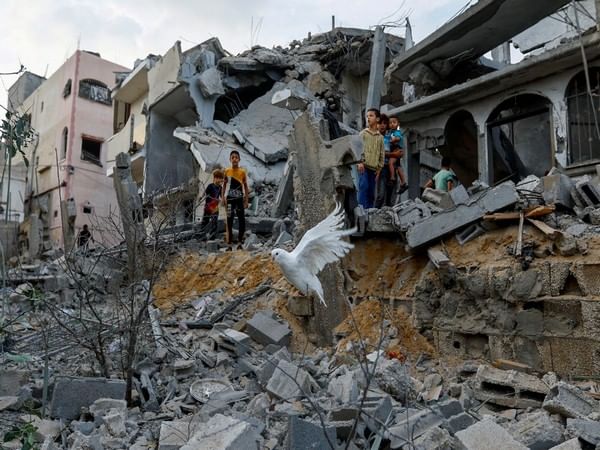Washington DC [US], November 5 (ANI): As the situation in the Middle East continues to remain tense even after a year into the Gaza war, political scientist Ian Bremmer, said there is no consensus within the Israeli government for bringing the conflict to an end, and Hamas still retains the ability to maintain its organisational structure despite the killing of its strong hardline chief Yahya Sinwar,
Ian Bremmer is the president and founder of Eurasia Group, a geopolitical risk advisory firm, and GZERO Media, a company providing intelligent and engaging coverage of international affairs.
In an email interview with ANI, Bremmer said that though the October 7 attacks have made achieving a two-state solution very difficult, there is a “renewed interest” globally, as well as in the region, to bring “sustainable solutions” to the long-standing Israeli-Palestinian conflict.
On being asked whether the killing of Hamas chief Yahya Sinwar could lead to the end of Hamas, the political scientist said, “The killing of Yahya Sinwar is symbolically significant and reflects an important “win” for the Israeli government, but it does not represent the end of Hamas or its ideologies. Hamas also retains the ability to maintain an organizational structure within and outside Gaza.”
He also pointed out that though international efforts to reach a ceasefire in Gaza will continue, the road is not easy as Hamas has even refused limited terms for a ceasefire.
“Sinwar’s death will lead to a revival of international diplomatic efforts on Gaza, but Hamas has continued to refuse even limited terms for a cease-fire. Israel’s offensive on the ground in Gaza will also continue in parallel,” he said.
Sinwar and two other terrorists were killed in a chance encounter with Israeli soldiers in Rafah last month. His body was taken to Israel and positively identified based on DNA samples and dental records Israel had from Sinwar’s imprisonment.
Following Sinwar’s death, Israeli Prime Minister Benjamin Netanyahu addressed the people of Gaza, saying that the war could end as soon as tomorrow if Hamas agrees to lay down its arms and return the hostages.
The Eurasia Group President further emphasised that the Israeli government also lacks consensus about reaching an end to the offensive and there are varied views of what role Israel should play in Gaza after the conflict ends.
“There is no one consensus view within the Israeli government about the end state of the current offensives and conflict more broadly. Israel will retain security control of Gaza for the near term future at a minimum, but the views on the role Israel should continue to play beyond that and what type of governance model varies widely. For example, some of Netanyahu’s Likud party members are pushing for resettlement of Gaza, which will trigger increased international criticism,” Bremmer said.
He further said that the idea of reaching a two-state solution has become “much more” difficult due to the hardening of positions in Israel post-October 7 attacks followed by the destruction in Gaza.
“The two-state solution has become much more difficult following the hardening of positions on the Israeli side after 7 October and the destruction in Gaza,” he said.
“But there is also a renewed interest in the region and more globally to advance sustainable solutions to the Israeli-Palestinian conflict that would prevent further cycles of violence, and the two-state solution remains important in the context of those frameworks,” Bremmer added.
Hamas launched a massive terror attack on Israel on October 7 last year, killing over 1200 people and holding over 250 as hostages. Around 100 of them are still in captivity, many are feared dead.
In response, Israel launched a strong counteroffensive targeting Hamas units in Gaza. The Israeli operation, however, has killed over 45,000 Palestinians in Gaza. The mounting civilian toll has raised global concerns and increased the call for a ceasefire.
With time, the conflict has escalated further, with Houthi rebels from Yemen and Hezbollah from Lebanon — both considered Iran’s proxies — also increasing their offensive against Israel, compelling Tel Aviv to indulge in a multi-front war.
On October 1, Iran entered the conflict directly by launching a barrage of over 200 ballistic missiles towards Israel. After vowing retaliation, around a month later on October 26, Israel launched “precision strikes” against Iran targeting Tehran’s military targets.
In response, Iran’s Supreme leader, Ayatollah Ali Khamenei said that the attacks by Israel “should neither be magnified nor belittled” and warned Israel to recognise the strength and determination of the Iranian people.
Speaking on the recent Israeli strikes on Iran and further escalation of the conflict, Ian Bremmer said that Israel might revisit its decision not to strike any nuclear facility in Iran, if Tehran makes another strike against Tel Aviv, including through its proxies.
“Israel retaliated against Iran in a meaningful manner, focused on it military targets, but elements of the nuclear program or energy infrastructure were off the table. If Iran were to decide to make a further strike against Israel, including through proxies, that Israeli decision would be revisited,” the political scientist further said. (ANI)
This report is auto-generated from ANI news service. ThePrint holds no responsibility for its content.






